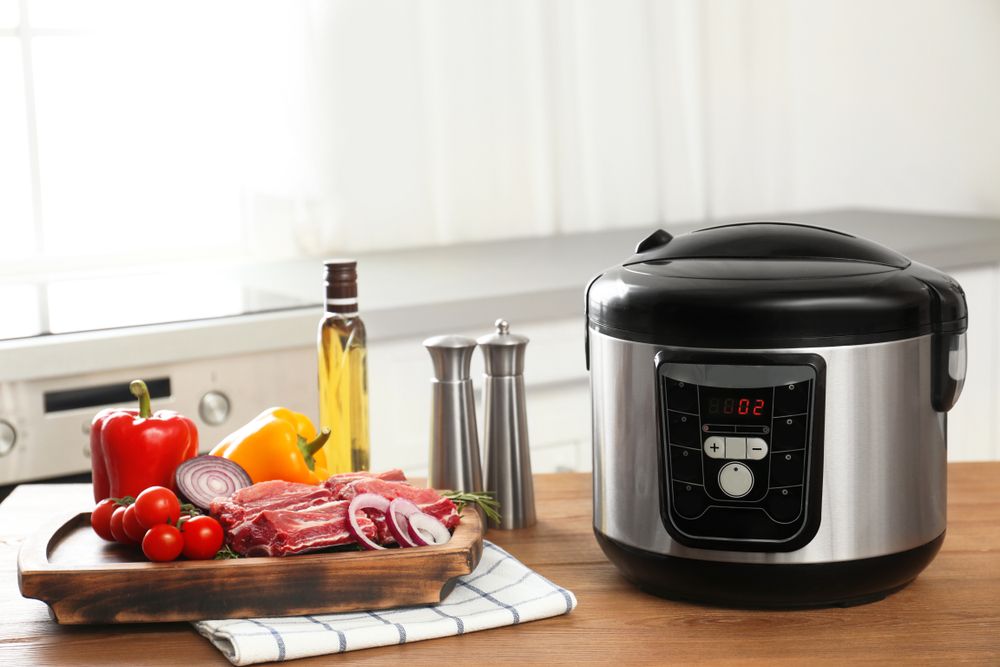Pressure cookers have long been a favorite in kitchens around the world for their ability to cook food quickly while preserving flavor and nutrients. Whether you’re making stews, soups, rice, or tougher cuts of meat, a pressure cooker delivers tender, flavorful meals in a fraction of the time. But when it comes to choosing the right type, you’re likely to face one big decision: electric or gas?
Both electric and stovetop (gas) pressure cookers have their strengths and drawbacks. The right choice depends on your cooking habits, kitchen setup, and preferences for control, speed, and safety.
Here’s a side-by-side comparison to help you decide which pressure cooker suits your lifestyle best.
What Is an Electric Pressure Cooker?
An electric pressure cooker is a self-contained appliance that plugs into an outlet and often includes multiple cooking modes. Think of popular brands like Instant Pot — these cookers combine pressure cooking with other functions like slow cooking, rice cooking, steaming, sautéing, and even yogurt making.
Key Features:
-
Programmable cooking options
-
Built-in timers and presets
-
Safety features with automatic pressure regulation
-
Multi-functionality (replaces multiple appliances)
-
Heats via internal electric element
What Is a Gas (Stovetop) Pressure Cooker?
A gas pressure cooker, also known as a stovetop model, is a more traditional kitchen tool. It doesn’t have any electronics or digital controls. You place it directly on your stove — gas, induction, or electric — and manually monitor the heat and pressure.
Key Features:
-
Typically made from stainless steel or aluminum
-
Heats quickly using direct flame or stove heat
-
Requires manual temperature and pressure adjustment
-
Often used by experienced home cooks or professionals
-
Can reach higher pressure levels than many electric models
Pros of Electric Pressure Cookers
1. Convenience and Automation
Electric pressure cookers are ideal for those who want a set-it-and-forget-it approach. You simply select the cooking program, close the lid, and wait for it to finish.
2. Multiple Functions in One Appliance
Many electric models offer additional settings like slow cook, sauté, steam, and keep warm. For small kitchens or minimalists, it replaces several appliances in one unit.
3. Built-in Safety Features
Electric cookers come with multiple sensors, auto shut-off features, and locking mechanisms, reducing the risk of mishandling.
4. Energy Efficient
Because it’s well insulated and uses electricity efficiently, an electric pressure cooker doesn’t heat up your kitchen or draw much power.
5. Great for Beginners
With guided presets, automatic timing, and little manual control needed, electric models are beginner-friendly and forgiving.
Cons of Electric Pressure Cookers
1. Slower to Reach Pressure
Electric models take longer to heat up compared to gas stovetop models. It can take 10–15 minutes just to reach pressure before cooking even begins.
2. Limited Pressure Levels
Most electric pressure cookers operate at a lower PSI than gas models, which can slightly affect cooking time and results, especially for certain recipes.
3. Bulky Design
Electric pressure cookers tend to be larger and take up more countertop space. They’re also heavier and not ideal for storing in tight spaces.
4. Less Control During Cooking
Once started, you can’t adjust the temperature or pressure as precisely as with a stovetop model. You’re mostly relying on the built-in presets.
Pros of Gas Pressure Cookers
1. Faster Cooking and Heat Response
Because they use direct heat from the stove, gas pressure cookers heat up quickly and respond instantly to changes in heat settings.
2. Higher Pressure Output
Stovetop cookers generally reach higher pressures (up to 15 PSI), which can result in faster cook times and better caramelization or browning.
3. Durable and Long-Lasting
With no electronics or digital components, stovetop pressure cookers can last for decades with proper care. They’re also dishwasher safe in most cases.
4. Ideal for Experienced Cooks
If you enjoy hands-on cooking and want more control over the process, a gas model gives you full command of timing, pressure, and temperature.
5. Compact and Easy to Store
With a simpler design, gas cookers are generally lighter, more compact, and easier to tuck into a cabinet when not in use.
Cons of Gas Pressure Cookers
1. Steeper Learning Curve
New users might find it challenging to know when the pressure is just right or when to lower the heat. It requires practice and attention.
2. No Built-in Timer
You’ll need to track cooking time manually and stay near the stove to adjust heat and pressure as needed.
3. Fewer Safety Features
Modern stovetop models have safety valves and locking lids, but they still require more caution and experience than electric models.
4. One-Function Tool
Unlike electric models, stovetop pressure cookers usually don’t offer multiple cooking modes or programmable features.
Which Should You Choose?
Here’s a quick guide based on your preferences and lifestyle:
Choose an Electric Pressure Cooker if:
-
You’re new to pressure cooking and prefer automation
-
You want one appliance that replaces several others
-
You often cook meals while multitasking
-
You like digital controls and built-in timers
-
You live in a small apartment without a gas stove
Choose a Gas Pressure Cooker if:
-
You’re an experienced cook who wants full control
-
You prefer faster pressure buildup and cooking times
-
You’re cooking for a crowd or using large quantities
-
You want a tool that will last for decades
-
You have limited counter space and want easy storage
Cost Comparison
-
Electric Pressure Cookers: $80–$200 depending on features and brand
-
Gas Pressure Cookers: $40–$120 depending on material and size
While electric models may cost more upfront, they often replace other appliances (like a slow cooker or rice cooker), which can balance out the investment.
There’s no one-size-fits-all answer when it comes to pressure cookers. Both electric and gas models have advantages — and the best choice depends on how you cook, how much control you want, and what type of kitchen you’re working with.
Electric pressure cookers are great for convenience and modern versatility. Gas stovetop pressure cookers are better for speed, control, and durability. Whichever you choose, you’ll enjoy faster cooking, more flavorful meals, and the satisfaction of mastering one of the most useful tools in your kitchen.



